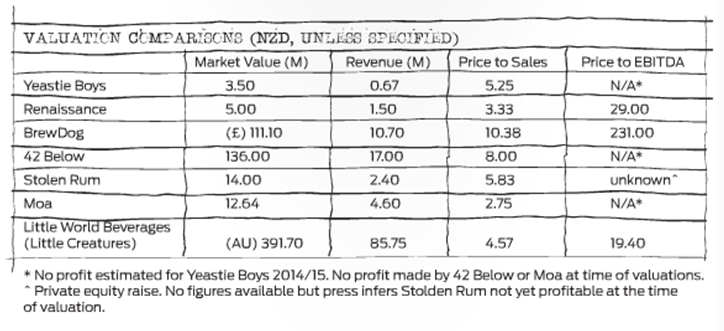Nice idea. A Collaboration Beer, which has become the highlight of the annual Australian International Beer Awards (AIBA), is created by the previous year’s Champion brewers in the Large, Medium and Small Australian Brewery categories.
In March 2015, Australian media speculated that the drop in sales of the Heineken brand in Australia could have been caused by trendy inner-city types spurning the locally brewed version because it is made by Lion under licence, and not imported like many other premium beer rivals.
It may just be a rumour: Beijing’s Yanjing Brewery Co., China’s third-largest brewer, plans to sell about a 20 percent stake to a foreign strategic partner, media reported in early February 2015.
As crowdfunding goes, this was quick! The well-known Kiwi craft brewer Yeastie Boys recently conducted a highly anticipated share offer. On 28 January 2015 fans of Yeastie Boys’ award-winning ales were able to buy a piece of the company, via an equity crowdfunding campaign on PledgeMe.
That sinking feeling. According to estimates, beer sales in Australia declined over 2.6 percent in 2014. How come? Has beer become too expensive? Or have consumers switched to other drinks? The only one not worrying is Coopers Brewery from Adelaide. The family-owned brewer saw sales increase 7.4 percent in its past financial year (end of June 2014). In the calendar year 2014 it brewed slightly under 800,000 hl beer, which means that Coopers now holds about 5 percent of the total Australian beer market, the company’s strongest position in its 153-year history.
There is always a way, even with fines. The years long tax dispute between Diageo Korea and the Korean Customs Office came to an end on 7 January 2015 after the Korean branch of the world’s largest distiller decided to accept a court’s mediation, Korean media reported.
Things are getting political. The Australian Real Craft Brewers Association (ARCBA) is calling on the World Trade Organization (WTO) to push for equality and fair trade for small independent craft breweries. In a press release dated 27 November 2014, the ARCBA attacked its government for not taking a stand for Australian industries in a clear unfair trading position. Arguing that Australia’s government has not brought the taxation on beer into line with OECD 33 countries and WTO member countries, which puts Australian craft brewers in a disadvantageous position in trading terms vis à vis imported beers, the ARCBA has asked the WTO and the Australian Government to move to an international definition of ’small brewery’ across all member countries and for all countries to extend the same level of government support and subsidies to these ’qualified’ breweries irrespective of their country of origin.
Will Cricketers Arms become the Blue Moon of the Australian craft beer market? Billed a more mainstream craft beer brand, sales of Cricketers Arms have jumped off the back of a recent revamp.
Economic stagnation, a rapidly ageing population and consumer money hoarded rather than spent are usually blamed for the declining demand in the Japanese alcoholic beverages sector. If that sounds like what could lie in store for Old Europe, shouldn’t Western brewers take a long hard look at Japan?
Their creative accounting was not rewarded. Two private equity firms will have to pay Asahi Group Holdings’ local subsidiaries USD 200 million (EUR 160 million) to settle a dispute over the Japanese company’s acquisition of Independent Liquor in 2011. Asahi paid Pacific Equity Partners and Unitas Capital USD 1.3 billion for New Zealand’s beverage company Independent liquor, which was the Japanese brewer’s biggest purchase at the time.



